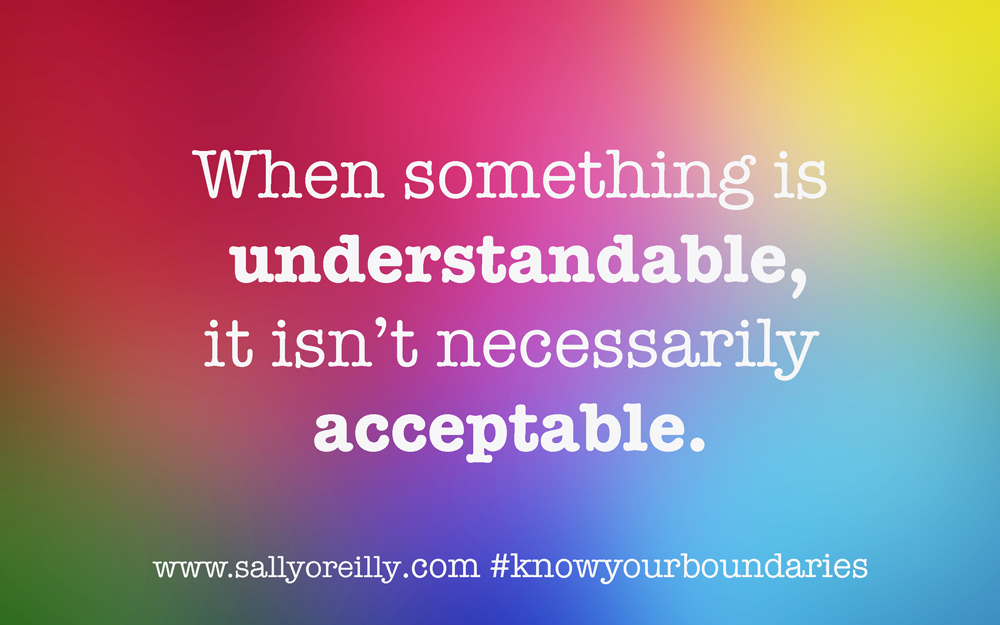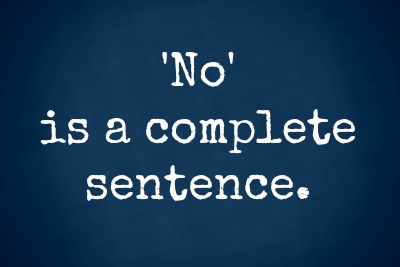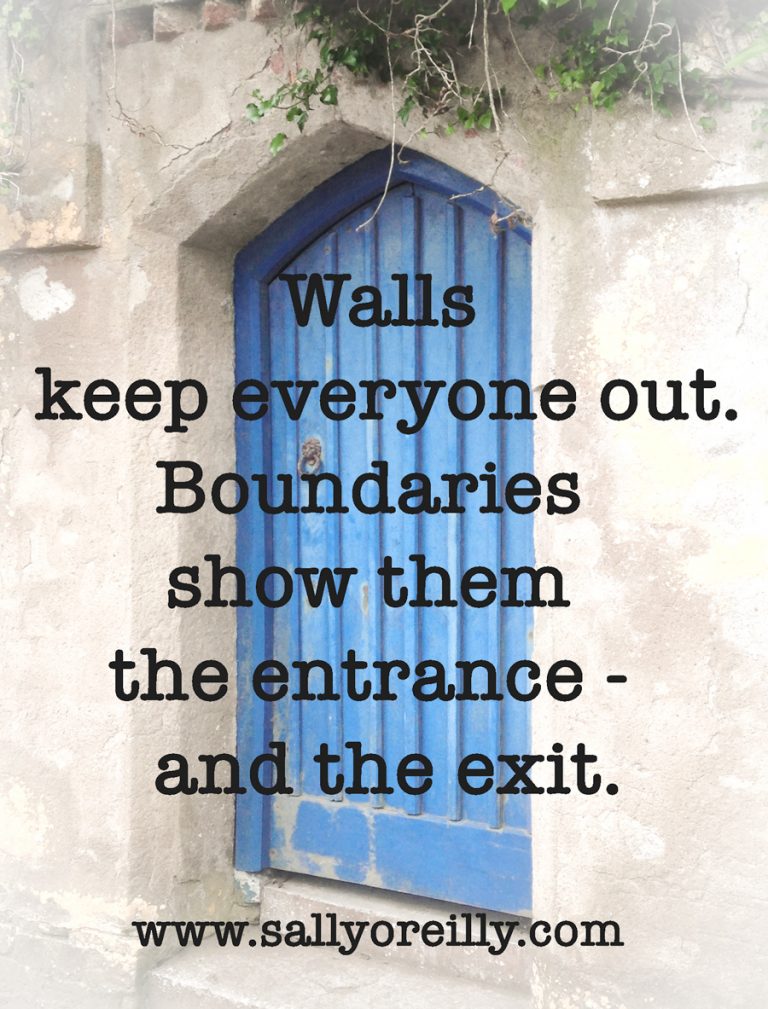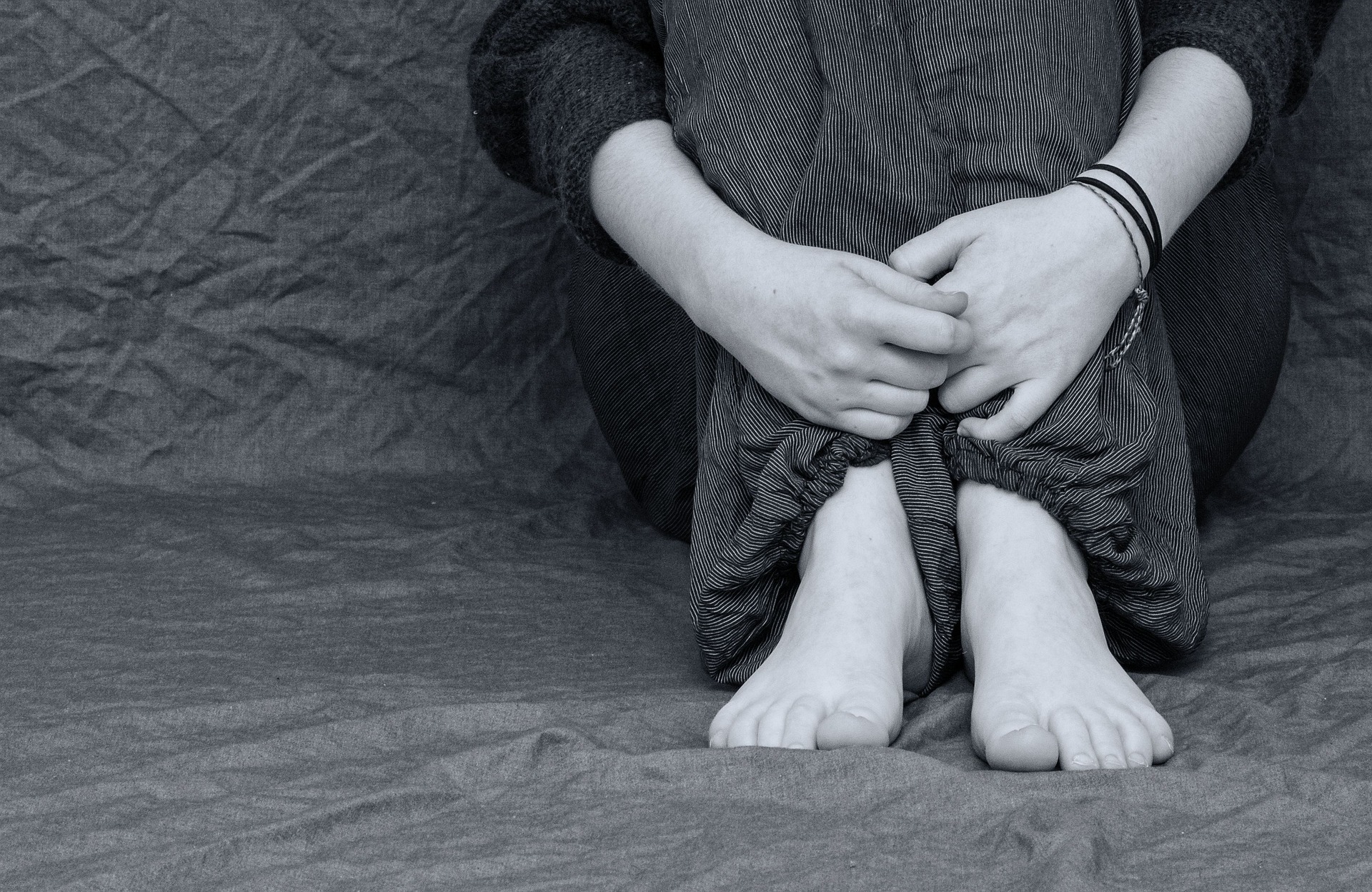We’re trying to buy a house at the moment and there’s been a lot of talk about boundaries. It’s a word I just can’t seem to get away from at the moment! Maps, walls, elections, referendums, therapy … Clear boundaries are crucial to smooth transactions, good legislation, good mental health – the list is long. And gets longer the more you think about it!
But what do mental health professionals mean by ‘healthy boundaries?’
“Boundaries” comes up a lot in therapy actually. Truth be told a lot of my work with clients is around boundaries – first finding them, or their absence, then strengthening them, sometimes loosening them a little. It’s hard to work on something that’s difficult to define though isn’t it?! We may have a sense of what boundaries are but the concept can be difficult to describe. Boundaries are not concrete. There are no rules, no one-size-fits-all. So, if you’re not sure what exactly they are, then you are definitely not alone.

Because we create and maintain our own boundaries, they are often something we don’t even notice. It’s an ‘unconscious’ thing for most of us – unless we’re actively working on it. If we are lucky, we’ve had parents or other adults who have role modelled healthy boundaries to us and so we learn automatically how to have healthy boundaries too. We learn this stuff as easily as we’ve learned to speak whatever our native language is – no-one sat you down to teach it to you, it just sorta seeped in and became the way you speak.
It’s exactly the same with boundaries – when we have good boundaries we just know when to say ‘yes’ or ‘no’ – and we feel no fear when we do it. If we are lucky.

But not everyone is that lucky.
Healthy boundaries are rooted firmly in a clear sense of self-worth. If we value ourselves, we tend to have healthy boundaries. If we don’t, or if we’re uncertain about our worth, then our boundaries become fuzzy, weak, rigid, broken. And that makes us vulnerable to getting hurt or abused (or abusive!).
If you find yourself saying “People always take advantage of me” or asking “Why am I always treated so badly?!” then it’s possible that you have “unhealthy” boundaries.
The good news is that this is totally workable!
So what do healthy boundaries look like?
I’m going to guess that you have someone in your life whom you just know will not allow you to take advantage of them. Take a moment – visualise this person. They are someone whom you know will say ‘no’ if you try to push them to do something they don’t want. Who won’t meet you or do you a favour unless they are truly willing, able and have the time? Someone who can say ‘no’ to you without being aggressive or rude.
Someone who won’t take you on the mother of all guilt trips?
That person has healthy boundaries. They are clear about what’s right for them and they can stand their ground and own their decisions without attacking or blaming you, others or themselves. They have a strong sense of self worth – they believe they are worthy of good treatment.
And, even if you don’t always like that they say no when you would rather that they say yes, you probably feel safe with this person. You have a sense that they are ‘solid’.
That’s their boundaries that you’re sensing right there.
People with healthy boundaries don’t just treat themselves with respect – they naturally treat those around them with respect, too. They may understand poor behaviour – but they don’t necessarily accept it.

So, what do unhealthy boundaries look like?
An unhealthy boundary leads us to say ‘yes’ when we’d rather say ‘no’. When we do that, we may become resentful, aggressive, ‘blamey’ and we may not take responsibility for our own choices and decisions.
When we have poor boundaries, we often surround ourselves with similarly boundried people and wind up being abused (or being abusive) – in mild ways all the way up to dangerous ways. We might lie about people, exaggerate what they ‘do to’ us in order to avoid taking responsibility for mistakes or wrong doings. We might ‘help’ lots of people but complain that they are so needy or take up our time. We might ‘bitch’ about people in an effort to prevent others from liking or ‘siding’ with them, because in truth we are afraid.
Afraid that we are not worthy.

Here’s another thing: sometimes our boundaries are really strong and healthy in some situations or with some people, and poorer with others. I’m aware that I have to work hard in some situations to mind myself whereas in others it comes so easy I literally don’t notice. You might find that too. For example – it might be hard for you to be around active addicts, or abusive people, or ungrounded ‘flighty’ people. These people might be ‘triggers’ for you ( I’ll talk about triggers another day. That’s another word we use a LOT!)
Two helpful questions to ask yourself:

1 What’s happening to your sense of self-worth in the places where you have difficulty?
2 What beliefs do you have about yourself that are influencing the way you allow yourself to be treated?
I realise that these are big questions – and in themselves might be triggering. So please do feel OK about seeking peer or professional help and support with the answers if you find yourself upset or suddenly aware of painful issues. Luckily we live in an era now where there is more emotional support available than ever!
The steps
The huge first step in changing our boundaries and making ourselves (and people around us) safer is to know that our boundaries are not the responsibility of others. The next piece is knowing, really knowing, that we deserve respect. Naturally, we all deserve respect. But only we alone can teach other people that we believe we are worthy of that respect, and we can only teach others if we believe it about ourselves first.
As a wise therapist said to me once – everything you do teaches those around you how to treat you.
Everything. Imagine!
[bctt tweet=”Everything you do teaches those around you how to treat you. #boundaries #mentalhealth #selfcare #selfworth ” username=”psychosal”]
It’s a great thing to keep at the forefront of your mind – and it really does help me to keep check of my boundaries – and I hope it will help you too!

My lovely friend and colleague Tanya Tinney and I first posted a version of this on Two Wise Chicks two years ago (!!?!)
*update – we got the house!! Yay!

One thought on “What’s a boundary anyway?!”